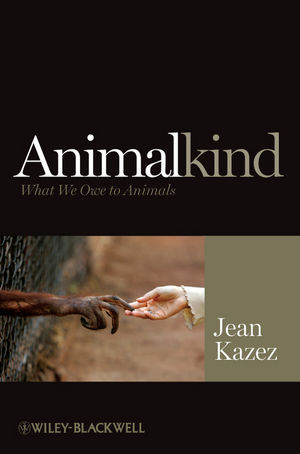Animalkind: What We Owe to AnimalsISBN: 978-1-4051-9937-7
Hardcover
216 pages
January 2010, Wiley-Blackwell
 Other Available Formats: Paperback
|
||||||
“Animalkind targets generally educated audiences with an interest in the field ... and though [it] reads more like a trade offering than textbook, [it] would be suitable for a continuing education class or cafe-style seminar/salon.” (Society & Animals, 1 May 2015)
"You may not agree with her conclusions, but Animalkind contains thoughtprovoking, careful, articulate philosophy . . . This book would be useful for courses in applied ethics or simply for anyone interested in addressing challenging arguments regarding animal welfare and advocacy." (Philosophy in Review, 1 August 2011)"The book is excellent reading for those with no prior exposure to the relevant philosophical literature and could be used for a portion of an introductory level course in contemporary moral issues." (Notre Dame Philosophical Reviews, October 2010)"Jean Kazez's 2010 book Animalkind: What We Owe To Animals manages to breath a bit of fresh air into many of the debates over our ethical duties and commitments toward other animals." (Between the Species, August 2010)
"Kazez has a superb, easy style, and is in full command of the material, at least in terms of the facts....... The book has a strong and welcome personal flavour, enhanced by many interesting anecdotes and asides." (The Philosopher, September 2010)
"Animalkind is a wonderful text for those who want to make an intelligent historical argument for the ethical treatment of animals but don't necessarily know how to go about it." (VegNews, October 2010)
"Kazez has many highly plausible things to say. The fascinating spectrum of animal capacities is brought to the fore, and the reader is quickly convinced that even if they are instinctual, animals are also highly cognitive creatures, capable of thinking, feeling and awareness. The arguments she presents are intelligent and convincing. Kazez writes in an enjoyable and accessible fashion, and wit and humour are used generously. Combined with many fruitful arguments, this makes the book a good read for anybody curious about whether it is, indeed, morally justifiable to eat one animal and love another." (Times Higher Education, April 2010)
"Recent philosophers say that animals are like us ... and we must therefore treat them with the respect owed to human beings. Jean Kazez explores a middle path between these views in her book, Animalkind. Animals aren’t just things ... we have to treat them with all due respect ... .It's complicated, and you have to think things through carefully, case by case. Kazez takes the world’s ragged edges seriously. The result is a readable, compelling, and thought-provoking account of our difficult relationship to animals. Kazez sees many shades of grey, all the while guided by a certain notion of respect. Kazez knows that we struggle to be good,and it’s not an all-or-nothing affair. It’s the effort of a philosopher doing honest work in the world." (The Philosopher's Magazine, March 2010)
"What's the right way to look at animals? Kazez ... examines this moral dichotomy in the new entry in Blackwell's Public Philosophyseries. In examining the human-animal divide in indigenous myth and in philosophers' thoughts ... .Kazez brings the reader to a central question: are humans and animals on two different moral planes? In well-written prose, the author navigates the minefields of different philosophers' takes on the value of animals and of whether or not people and animals are of equal value. What difference does it make to save one individual animal or for one person to decided to follow a vegetarian lifestyle? With a well-annotated bibliography, this is an excellent place to begin a trek through the thorny issue of animal rights." (Booklist, February 2010)
"In this cogently argued book, Kazez explores how we should treat other animals. The central theme is respect. Kazez takes a fresh, often funny, look at difficult issues." (BBC Wildlife Magazine, February 2010)
"Presents a thought-provoking foray into our complex and contradictory relationship with animals." (TSO, January 2010)
"Combining both philosophical concepts and practical examples of the application of the concepts, this book will make readers on both sides of animal issues think very deeply. Essential reading for everyone who is interested in ethical issues regarding the use of animals."—Temple Grandin, Colorado State University, author of Animals in Translation
"Animalkind raises all the important ethical questions
about how we should treat animals. Whether you are a meat-eater or
a vegan, after reading Jean Kazez’s lively and concise book,
you’ll be provoked to think long and hard about her
arguments."
—Peter Singer, Princeton University, author of
Animal Liberation and In Defense of Animals: The Second
Wave
"An interesting read about the complex, challenging, and
frustrating aspects of human–animal relationships. Whether or
not you agree with the author's personal choices and stance, this
book will force you to think more deeply about who we are and who
'they' are and why we need to change the ways in which we treat and
mistreat other beings."
—Marc Bekoff, University of Colorado, author of The
Emotional Lives of Animals and Wild Justice: The Moral Lives
of Animals (with Jessica Pierce)



